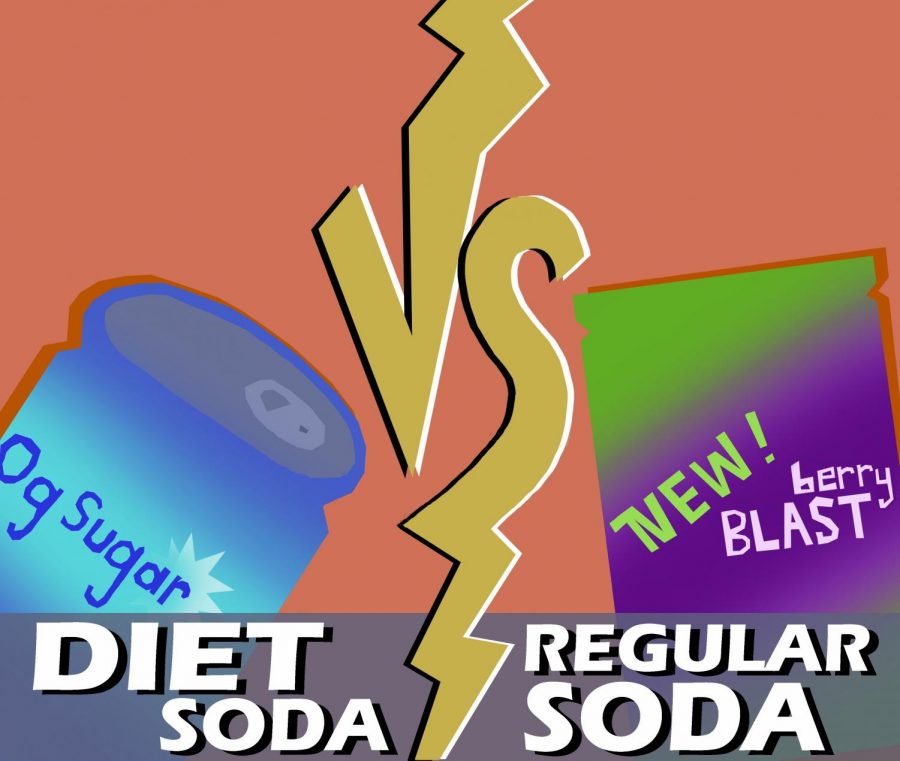Stay away from Diet Soda
THERE IS NO GOOD OPTION: The health risks of all sodas make even one glass far too much.
March 12, 2019
Diet soda is always sitting there in the store in their lightly colored cans, tempting vulnerable Americans to buy into the delusion. “Zero calories,” it reads. Who would not want to try a refreshing soda without all the fattening calories that go along with it? On the surface, diet soda seems too good to be true. But, everything else that goes in the drink makes it just as bad, if not worse than regular soda.
Awareness surrounding this topic is extremely important to the general health of Americans, so I was interested to know what the students of Issaquah High School knew about diet soda and regular soda.
Forty-eight percent of Americans drink at least one soda per day, which actually seemed to surprise most of the students I interviewed. All but one person predicted the percentage to be higher than 48. Sophomore Jack Smith thought it would be around 35 percent, but said the number “does not really surprise me much.”
It was pleasant to see that hardly any of my interviewees drank soda, yet junior Nihal Sathi was an exception who said he consumes “one or two a day.” Although he understood that soda can have harmful effects on the body, he believed that he is active enough throughout the day to account for it.
According to a study by Medical Daily, those who drink just one can of regular soda per day have a 20 percent increase in heart attack risk, and those who drink diet soda were 48 percent more likely. Now, people who drink soda may not have the best diets elsewhere, but I wanted to see how Issaquah High reacted to those percentages and how important of a role the soda played in those percentages.
Senior Caroline Freer says, “The people that drink regular soda every day don’t have a great diet; it is part of the problem but not the biggest concern.” But when it came to diet soda, she thought that “48 percent is quite a large number for it just to be a small factor, so it definitely contributes to it more than regular soda.”
Freshman Morgan Gentzen had a similar opinion, believing that it was more about the diet for regular soda drinkers because, “if you drink that much soda, you aren’t eating healthy elsewhere.” But, in the case of diet soda, “the percentage of increase in heart attack risk makes me think it has a much bigger role than regular soda.”
Regarding the 28 percent difference in heart attack risk, freshman Andrew Myerson concluded that “the number would not go up for no reason, so artificial sweeteners must have an even worse impact on the body than sugars.” Although they do take the calories out of soda, everything else it contains can cause irreparable harm.
According to PBS, rats exposed to artificial sweeteners releases less of a hormone called GLP-1, which controls “the speed at which food empties the stomach and enters the intestines.” When one’s GLP-1 level is low, the stomach empties faster and allows sugar to go more rapidly into the bloodstream. So, those rats experienced an abnormal spike in blood sugar when regular food was consumed. Not only is diet soda incredibly unhealthy in itself, but it also harms the way all other sugary foods are digested.
Diet soda may also appear like a way to lose weight by having fewer calories, but it can actually be quite the opposite. Medical Daily stated that, “artificial sweeteners found in diet sodas have been found to increase sugar cravings because it’s not a natural source of sugar and the brain continues to seek the real deal.” While there is the possibility for weight loss, it might be even more difficult to deal with the sugar cravings.
Lastly, I was interested to see whether students thought soda should have a warning label, considering the amounts of sugar, sweeteners and all the health risks that go along with them. All eight of my interviewees agreed that a warning of some sort should be on soda and diet soda. “Part of the problem is that people are not aware of what it can do to them,” said freshman Myerson.
Neither soda nor its counterpart is healthy, but diet soda has far more risks and health ramifications than regular soda. Although the idea of zero calories is tempting, artificial sweeteners ruin how the body digests food and can do far more damage that good if one is trying to drink it to lose weight. Studies have proven that although the sugars in regular soda are still terrible, they are far less causal of heart attacks and bodily damage than diet. Instead of having to worry about the health risks, I recommend not drinking either.




